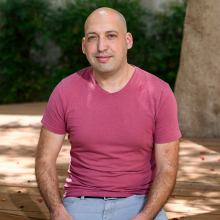Modern-day ocean explorer
Meet Dr. Rei Chemke
New scientists

Dr. Rei Chemke
Investigating the interplay between oceans and the atmosphere, Dr. Rei Chemke explores the climate’s response to a variety of natural and human-induced, or “anthropogenic,” factors. Natural factors (known as “forcings”) include changes in solar radiation, volcanic eruptions, and variations in the Earth’s orbital cycle—all of which are time-dependent events that alter the climate’s dynamics and thermodynamics. Greenhouse gases and aerosol emissions are examples of factors caused by humans.
“We can actually disentangle those two using models and see what the anthropogenic role on the planet is,” Dr. Chemke says.
He intends to zero in on the unique properties of oceans, whose large heat capacity and slow dynamics give them a lot of “memory”—a helpful readout of what happened or could happen in the past millennium or over the next decade. On short timescales, for example, the large heat capacity of the ocean delays surface heating, causing the day with the maximum surface temperature to occur potentially up to a month after the day with maximum incoming solar radiation. The time scale of circulation in the ocean, on the other hand, is approximately 1,000 years—enabling the system to retain significant information, or “memories,” of past events.
In his future lab at Weizmann, Dr. Chemke will use cutting-edge computational tools—some 4,000 high-powered computer cores—to run the most advanced climate models available. His group will sift through historic, current, and future climate data to see how humankind is affecting the environment on the regional and global scales.
The chaos of the climate
Across the globe, thousands of people in about 30 research groups are working on different types of climate models. A wide variety of models with different parameters is necessary in order to ensure that results are not dependent on a specific model’s configuration. At their core, the models Dr. Chemke uses involve fundamental mathematics equations of atmospheric and oceanic fluids, which take into account complex physics, the chemical properties of atmospheres and oceans, biochemical cycles on land, and ice interactions with oceans.
“The climate is constantly changing with time,” he says. “Since this is a chaotic system, it is very sensitive to the initial conditions you give in models, which is why a large ensemble of simulations is needed
to capture the human fingerprint on climate.”
Dr. Chemke hopes to shed new light on the future habitability of the planet by further dissecting the interactions between oceans and the atmosphere, and the impact of anthropogenic emissions.
Hailing from the Western Galilee community of Ya’ad, Dr. Chemke completed his BSc in climate, atmospheric sciences, and oceanography summa cum laude at the Hebrew University of Jerusalem in 2012. He went on to pursue graduate studies in atmospheric dynamics with Prof. Yohai Kaspi in the Department of Earth and Planetary Sciences at the Weizmann Institute of Science—earning his MSc in 2014 and PhD in 2017. After receiving the NOAA Climate and Global Change Postdoctoral Fellowship, he moved to Columbia University in New York, where he will stay until his October 2020 return to the Weizmann Institute as a senior scientist.
Dr. Chemke’s professional and academic honors include a Lev-Zion Scholarship for Excellent PhD Students in 2015 and Rieger Foundation-Jewish National Fund for Environmental Studies Fellowships in 2015 and 2016. He also received the Prof. Israel Dostrovsky Prize of Excellence from the Weizmann Institute in 2016. When he is not studying the Earth’s climate, Dr. Chemke enjoys playing and watching basketball, playing guitar, and traveling. He is married and has a baby girl.








